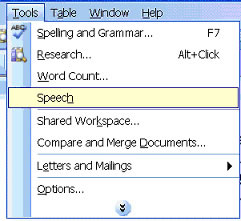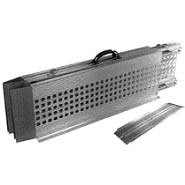|
Volume 15, No. 2, Spring 2007 |
Subscribe to AT Messenger Download PDF Viewer |
| PDF Version (for printing) Large Print (PDF) Text Version |
Quick AT for a Temporary Disability
Dan Fendler, AT Specialist
Sussex County ATRC
Recently, I got a call from my son Brian's science teacher. She had broken her predominant arm in a fall, had a cast on, and was having a tough time using the computer. She wanted to know if there was anything that could help her during the time she would be wearing a cast.
We often get calls from people experiencing temporary disabilities resulting from accidents, surgeries, or other circumstances. Often, they do not know where to turn for help, and may not be aware
that help is indeed available.
A loss in mobility, such as Brian's teacher had experienced, can impact an individual's day-to-day life in many ways. The loss of a predominant arm has a particularly dramatic impact. It will affect everything, including dressing, bathing, grooming, driving, keyboarding, and working. In this case, there are a number of things that can help.
One-handed Computer Tips
There happen to be a number of things to try if you need to access a computer using one hand. Be aware that there are a number of keyboards available that can help one-handed typists. There are a number of different keyboard layouts available–that is, keyboards with the keys placed differently than standard keyboards. Alternate keyboard layouts can contribute to faster typing speeds, but many people are reluctant to learn other layouts. If learning a new keyboard layout is not your cup of tea, consider using a smaller keyboard. Using a keyboard with smaller keys can make it easier to span the keys with your hand, useful for performing multiple press keystrokes.
You can also use several accessibility features of the Windows operating system. StickyKeys is a setting that is included in the XP operating system. For a one-handed typist, it can help with capitalization. Turning it on will help you capitalize the first letter of a sentence, eliminating the need to hold the shift key and another key simultaneously. With StickyKeys on, pressing the shift key and releasing it will cause the next letter to be capitalized. The StickyKeys setting can be found in the Windows Control Panel under Accessibility Options.

Microsoft Word Tools Menu
Another Windows XP feature that might help is switching the right and left mouse buttons. If you need to use the mouse with your left hand, you can change (reverse) the buttons to make it easier to use. The settings for reversing the mouse buttons can be found in the Windows Control Panel under Mouse options.
The single most productive feature to try is the use of a speech-to-text product such as Dragon Naturally Speaking (DNS). DNS will allow you to "train" your computer to understand your voice, and turn it into text. This can greatly reduce the number of keystrokes you need to make. Many people are hesitant to spend the money to purchase DNS, but if you already own a Microsoft Word 2003 license (or newer), you already have DNS on your computer. All you need to do is turn it on and train it. In order to turn it on, fire up Word, select Tools, then select Speech. You will be prompted to read several passages so that the computer can learn to recognize your voice. Once done, you will be able to "talk" to your computer.
If the DNS components were not installed when you installed MS Word on your computer, you may need to reinsert the MS Word disc to activate DNS.
The new Windows Vista operating system has several new accessibility features built into it. Check the Microsoft website, www.microsoft.com/enable/products/windowsvista, for more detailed information.
Other Temporary Disabilities

Suitcase ramp (shown folded)
One of the items in our library for which we get frequent requests are our portable, folding ramps. Many people who have either had an accident or surgery may need assistance getting in and out of their house due to the use of a wheelchair or crutches. The folding ramps can provide easier access to a home with three- or four-stair entrances.
Whatever your temporary need, if you need some assistance with Assistive Technology, give us a call. We're here to help.

